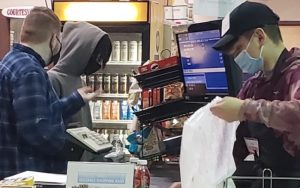
Monmouth County Vocational School District students train in an on-campus supermarket that Wakefern Food Corp. helped establish to promote student learning in an environment that mirrors a modern supermarket.
Nearly two years into the COVID-19 pandemic, supermarkets continue to face significant labor shortages. County vocational-technical school districts in Monmouth, Ocean and Union counties are helping to meet this persistent need with specialized career programs that prepare students with disabilities for positions in supermarkets and other retail stores.
Nathan Kraemer, principal of the Monmouth County Vocational School District’s Career Center, said students in the supermarket program train in an on-campus space outfitted with industry-standard equipment to look and function as a small supermarket. They gain hands-on experience as well as transferable soft skills, which serve them well in any workplace setting, especially retail.
“Problem-solving, merchandising, money-handling and interpersonal communication all are addressed through the program and are highly valuable to employers in any customer-facing business,” he said. “Even if students enter a different industry after graduation, or in the future, they will have these important skills to help them secure and maintain employment; that is why our program is so valuable to our students with disabilities and their families.”
Students enrolled in specialized supermarket career programs typically spend half of each day at their home high school focused on academic learning, and travel to the county vocational-technical school for a half-day of career training and academic reinforcement.
Lisa Tauscher, principal of Union County Career and Technical Institute, said graduates of her district’s program have recently gone on to work in CVS and Walgreens pharmacies, in addition to area supermarkets.
“They have the skills and experience to work in any customer service role,” she said.
Union County’s program is unique in that students rotate through three separate concentrations: baking, culinary and supermarket technology. They spend one year focused on each area, but consistently work together to support the in-district supermarket, which provides retail and food preparation experience.
“Culinary and baking students prep items to sell in the supermarket; a culinary student may run to the supermarket to get an herb for a recipe. That is true teamwork. They learn the importance of it, and they learn how to work with others effectively,” Tauscher said.
Students in these programs can also walk away with a ServSafe Certificate, an industry-valued credential that anyone handling food needs for employment.
“This definitely increases students’ marketability as employees,” Kraemer stressed.
Kraemer added that supermarket programs like the one at Monmouth County Career Center help start students with disabilities on a career path toward securing employment in a promote-from-within industry following graduation. Monmouth County’s own supermarket instructors are both retired from industry and share similar stories of beginning as cashiers and baggers and retiring as store managers. He cited success stories of former students who have gone on to rise through the ranks and even one graduate who used the ServSafe credential to begin a career at Walt Disney World.
Employers, like Wakefern Food Corp., the ninth-largest employer in New Jersey’s food industry, also realize the benefits of these hands-on training programs focused on retail and food service. In fact, Wakefern has a designated liaison to work with 16 schools across New Jersey to support supermarket training programs for students with disabilities. That role is currently held by Jazmine Francis-Burton, a retail learning specialist, who oversees the partnership between the county vocational-technical programs and Wakefern. She supports the schools in maintaining the space and technology to mirror what students will experience in a modern supermarket.
“Partnering with these schools to help the special needs population with work-based training is one way for us to further our community involvement and give back in a meaningful way,” Francis-Burton said.
She added that most of the schools with supermarket programs partner on a local level with area grocery stores owned by Wakefern members.
“Those connections are important, and at the local level, it’s where we see the talent pipeline develop,” she said.
Tauscher said UCCTI has placed students and partnered with the ShopRite stores in Clark, Garwood and Springfield and welcomes representatives from industry on the school’s advisory board. She said students and parents also serve on that board and are equally appreciative of these training programs for students with disabilities.
While these career and technical education programs geared toward students with disabilities are not widely offered, they are critically important. They help meet workforce needs across the state, in markets, stores and shops found in just about every community in the Garden State. And, they support a state priority — largely championed by former Senate President Steve Sweeney — to include individuals with disabilities in the workplace, with access to training and other supports included in a package of bills recently signed by Gov. Phil Murphy.
Conversation Starter
Employers can learn more and express interest in partnering with county vocational-technical schools at careertechnj.org.
Read this article as it originally appeared in ROI-NJ Jan. 26.



